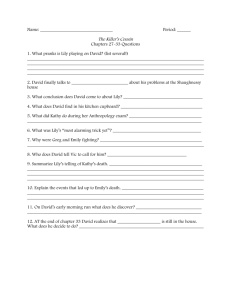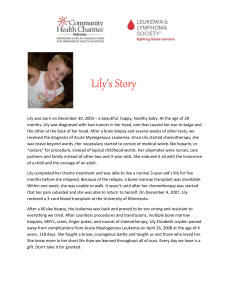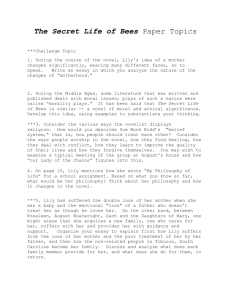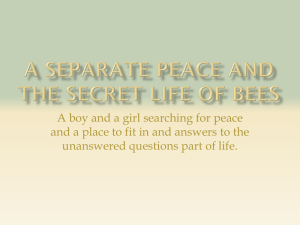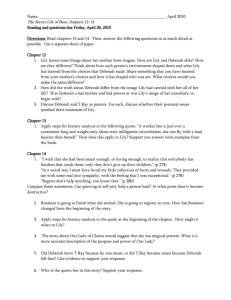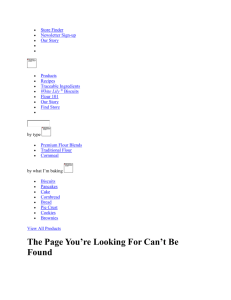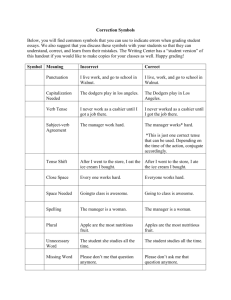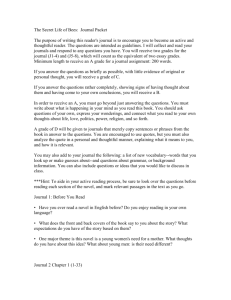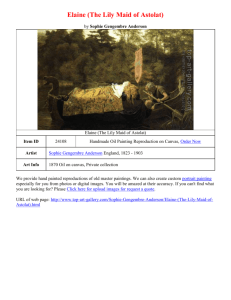Study Questions: Overall Novel
advertisement
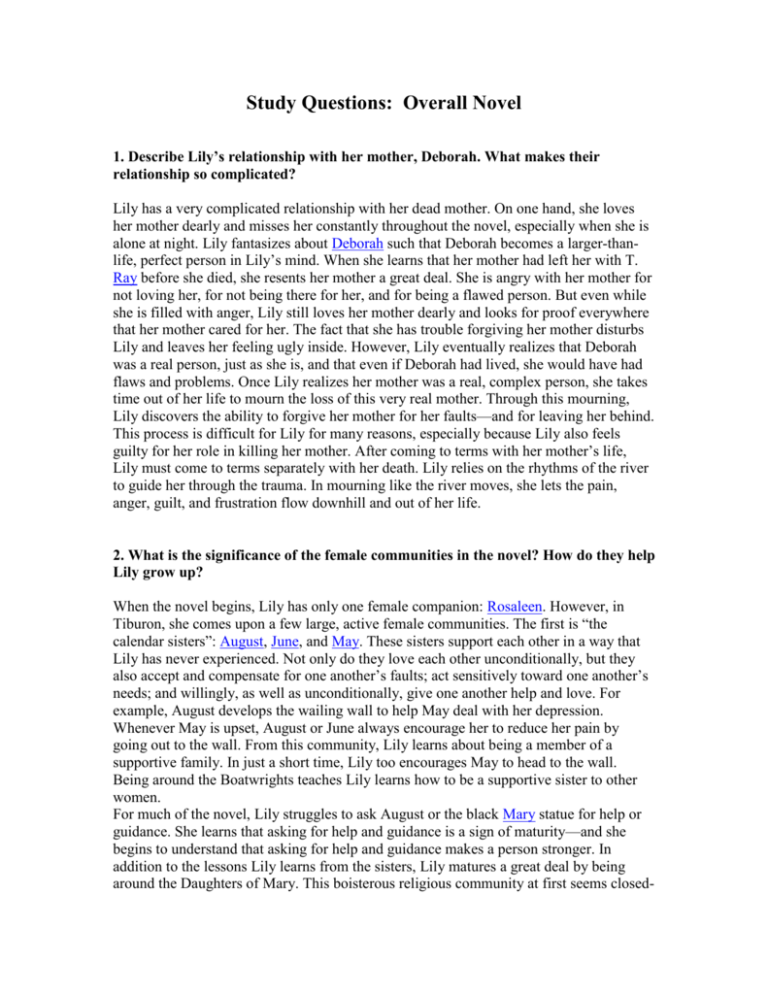
Study Questions: Overall Novel 1. Describe Lily’s relationship with her mother, Deborah. What makes their relationship so complicated? Lily has a very complicated relationship with her dead mother. On one hand, she loves her mother dearly and misses her constantly throughout the novel, especially when she is alone at night. Lily fantasizes about Deborah such that Deborah becomes a larger-thanlife, perfect person in Lily’s mind. When she learns that her mother had left her with T. Ray before she died, she resents her mother a great deal. She is angry with her mother for not loving her, for not being there for her, and for being a flawed person. But even while she is filled with anger, Lily still loves her mother dearly and looks for proof everywhere that her mother cared for her. The fact that she has trouble forgiving her mother disturbs Lily and leaves her feeling ugly inside. However, Lily eventually realizes that Deborah was a real person, just as she is, and that even if Deborah had lived, she would have had flaws and problems. Once Lily realizes her mother was a real, complex person, she takes time out of her life to mourn the loss of this very real mother. Through this mourning, Lily discovers the ability to forgive her mother for her faults—and for leaving her behind. This process is difficult for Lily for many reasons, especially because Lily also feels guilty for her role in killing her mother. After coming to terms with her mother’s life, Lily must come to terms separately with her death. Lily relies on the rhythms of the river to guide her through the trauma. In mourning like the river moves, she lets the pain, anger, guilt, and frustration flow downhill and out of her life. 2. What is the significance of the female communities in the novel? How do they help Lily grow up? When the novel begins, Lily has only one female companion: Rosaleen. However, in Tiburon, she comes upon a few large, active female communities. The first is “the calendar sisters”: August, June, and May. These sisters support each other in a way that Lily has never experienced. Not only do they love each other unconditionally, but they also accept and compensate for one another’s faults; act sensitively toward one another’s needs; and willingly, as well as unconditionally, give one another help and love. For example, August develops the wailing wall to help May deal with her depression. Whenever May is upset, August or June always encourage her to reduce her pain by going out to the wall. From this community, Lily learns about being a member of a supportive family. In just a short time, Lily too encourages May to head to the wall. Being around the Boatwrights teaches Lily learns how to be a supportive sister to other women. For much of the novel, Lily struggles to ask August or the black Mary statue for help or guidance. She learns that asking for help and guidance is a sign of maturity—and she begins to understand that asking for help and guidance makes a person stronger. In addition to the lessons Lily learns from the sisters, Lily matures a great deal by being around the Daughters of Mary. This boisterous religious community at first seems closed- off to Lily: they are all black ladies, and she is a young white girl. But their community is really based on pooling their feminine powers and in praying to their female divinity. Once Lily realizes the community is based around tenets of support and mutual love, she soon is able to derive support from the ladies and to love them as they love her. By the end of the novel, she is an active member in their support group, and she is stronger, more self-reliant and more mature for it. This female community teaches her how to seek the support of other women when she is in need. 3. In what ways does Sue Monk Kidd root The Secret Life of Bees in a specific time and place? How does this tie into Lily’s experience of coming-of-age? Just as the novel is about Lily’s personal experiences as a young girl discovering her femininity and searching for love, so is it a novel about a specific time and a place: the American South during the 1960s. Lily shares a birthday with the United States, a fact that inextricably binds Lily’s experiences to her country’s experiences. At one point, Lily watches a man walk on the moon, and at another she walks by banners that say “Goldwater for President” and “Affirmation Vietnam.” With these and other details, Kidd carefully reminds readers that her novel takes place during a particular time. Early in the novel, we learn that the Civil Rights Act has just been signed, and events influenced by the signing of this act seep into Lily’s experience as a fourteen-year-old girl in many ways. The Civil Rights Act left many white southerners anxious that their way of life would be threatened if increased rights were granted to African Americans. This fear, in turn, appears in the novel as the ever-present racial tension. More specifically, this fear leads Franklin Posey to bully Rosaleen when she sets out to vote, and it leads the white police to patrol the movie theater in Tiburon. This second example of the fear leads to Zach’s arrest and ultimately to May’s suicide. Lily’s maturity and development begin in earnest only after she has removed herself from the white community and gone to live in a black community. The changing social situation for African Americans directly leads to Rosaleen’s arrest, which leads Lily to leave T. Ray, to find August Boatwright, and to grow up. Important Quotes: 1. She was black as could be, twisted like driftwood from being out in the weather, her face a map of all the storms and journeys she’d been through. Her right arm was raised as if she was pointing the way, except her fingers were closed in a fist. It gave her a serious look, like she could straighten you out if necessary. In this quotation, from the beginning of chapter four, Lily describes the black Mary statue. Lily has just spotted it in the Boatwright house. She has yet to learn of its significance, to experience its important role in the lives of the Daughters of Mary, and to understand its place in the family history of the Boatwright sisters. Rather, Lily simply yet viscerally reacts to the statue’s material, color, and gesture. Immediately she feels that the statue is able to see deep into her true self. She believes that the statue is aware that she is lying to August and June about where she has come from and why she has come to Tiburon. Although she fears the statue, Lily also connects with Our Lady of Chains and realizes that it has special powers. These initial reactions help substantiate the role the statue will later take as the Boatwrights’ central religious artifact, which the Daughters of Mary pray to and which Lily goes to for guidance. But, more important, Lily thinks of the statue as the embodiment of a strong and defiant woman. So far, only Rosaleen has inspired Lily to be more powerful and independent. Lily has never had any other female role models, since her mother died when Lily was four and she lived isolated with T. Ray. Arriving in Tiburon, Lily realizes that she has the chance to act in any way she pleases, to become the person she has always wanted to be—and she grows into a strong, confident young woman through her experiences with the statue and with beekeeping. Reacting to this statue in the way she does foreshadows Lily’s eventual transformation. Readers see that Lily has the capacity to become a powerful woman, because she is able to recognize and feel magnetically pulled toward images of such a woman. 2. “I’ve just never heard of a Negro lawyer, that’s all. You’ve got to hear of these things before you can imagine them.” This conversation, between Lily and Zach, takes place in the middle of chapter 7 and encapsulates Lily’s limited understanding of how people may transcend social roles. At this stage, Lily has really own known one African American: Rosaleen. While she cares for Rosaleen, maybe even loves her, Lily still sees Rosaleen is a domestic figure—as a woman who fits into the stereotypical role of a southern, uneducated housekeeper. Later, readers learn that August once worked as a housekeeper as well, but like Lily readers learn that August chose another life for herself. Lily believes that people have set roles, which they cannot transcend: black women work as housekeepers, black men do not become lawyers, and poor white women like Lily go to beauty school. Zach and August help Lily understand the power of choice. Zach has decided to become a lawyer, and August chose to become a beekeeper. Both characters believe in themselves and in their ability to transcend the roles American society has chosen from them. Rather than simply accept their fates, Zach and August decided to work toward achieving their dreams. During their conversation, Lily does not mean to discourage or disparage Zach. She merely expresses the fact that she has never heard of an African American becoming a lawyer, much the same as she had never heard of an African American woman running a honey farm before meeting August. Zach feels empowered by his imagination: the mere act of picturing himself as a lawyer encourages this young man to work to make the image a reality. Lily will eventually discover that, through her writing, she will be able to empower the characters she writes about and engage social dilemmas that she finds restrictive. In her stories, she will depict Zach as a lawyer and Rosaleen triumphantly confronting her racist foes. 3. I can tell you this much: the world is a great big log thrown on the fires of love. Lily comes to this conclusion at the end of chapter 7, after she has her first semisexual interaction with Zach and has witnessed Neil and June have a fight. In these two very intense moments, she comes face to face with love and learns that it not only brings people together but also sometimes drives people apart. Just moments before this quotation, Lily was driving with Zach when she realized, definitively, that she loved him. Then, in the field, she licked honey off of his hand. These two experiences, involving emotional outbursts and physical interaction, only serve to confuse her as to the point of love in life. Lily does not have much experience with the positive effects of love. Her father, whom she loves, never shows any affection for her, and she has reason to believe that her mother, whom she so desperately wants to have loved her, abandoned her before Lily accidentally killed her. This complicated relationship to love leaves her without a clear idea of whether love can be a positive force in life at all, and she reaches the extreme, negatively charged opinion that the fiery passion of love destroys the world. Later in the novel, when Lily learns that love is not only about rejection and longing, her opinion of love softens a great deal, although she never recants on these poignant, passionate words. 4. “Most people don’t have any idea about all the complicated life going on inside a hive. Bees have a secret life we don’t know anything about.” As she explains the nature of spirituality as it relates to beehives, August speaks these words to Lily in chapter 8. August has taught Lily all about the communities bees keep inside their hives. Amongst other things, Lily has learned of the importance of the female power structure in the bee community: how the queen bee is doted on by a whole team of companions, how she lays the eggs that become every single other bee in the hive, and how this queen bee is the mother of thousands. For Lily, who has lost her mother, this sounds incredibly wonderful. She relates it almost immediately to stories from the Bible, and Lily begins to think of the bees as part God and part Mary, whom August also explains as a spiritual essence that is present everywhere, in everything. Taking these two ideas together, Lily decides that the mother Mary is the mother of thousands, and also in many ways her mother as well. The fact that Lily is a white girl living with black women, a runaway, and a criminal of sorts, means her life with August must remain a secret—just like the secret life of the bees that goes on inside the hive. In this way, the motherhood Lily believes Mary offers her is parallel to the support and love she gets from August and her community of women, a support that is secret to the world but that nourishes her and keeps her alive. The secret life that bees have is similar to the secret life of Lily Owens. Lily learns about the bees’ secrets from August, while we learn about Lily’s secrets from her first-person narration. Just as the bees produce the sweet honey that August is so attached to, Lily creates a bittersweet coming-of-age story about a young girl who finds strength, love, and family in unlikely circumstances. 5.“There is nothing perfect,” August said from the doorway. “There is only life.” This quotation comes at the end of chapter 12 and represents the relationship August has with Lily, to whom she speaks these lines. Initially, these words seem rather sharp, but, taken in context, they actually encapsulate the kind of invaluable maternal comfort August provides Lily. August teaches Lily about bees and about life. After Lily tells August the truth about her running away and her role in her mother’s death, Lily expects August to provide her with the empty phrases that people usually offer those who are upset. Instead, August offers rough-edged wisdom like the above line. Her words are not drowned in the saccharine sweetness of “it’s all going to be OK.” Rather, August prefers to guide Lily into accepting the realities of life. Lily needs to learn that how to deal with the good and the bad that come with life. August’s wisdom has been hard-won. She is an African American who has overcome many obstacles in her life to end up an independent land- and business-owning woman. Having just lost her sister May, she knows that nothing is perfect, and she knows that this lack of perfection is, by its very definition, the stuff that life is made up of. Although Lily does not realize it, this is exactly the kind of maternal wisdom Lily needs in order to grow up. These words act as the final statement of Lily’s big confession. With these words echoing in her head, Lily will realize that her mother was human: she loved Lily, but she also made mistakes. At a time when there is the most potential for navel-gazing and feelings of self-pity, August uses these words to keep Lily from getting lost inside her own misfortune. In this way, August functions as the novel’s hero: she rescues Lily, and she shows her a better way to live.
